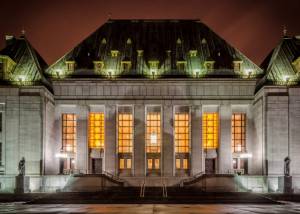Canadian Supreme Court Bans Prayer at City Council Meetings
 On April 15, the Supreme Court of Canada unanimously ruled to prohibit prayers at city council meetings in Saquenay, Quebec. The court said, “The state must instead remain neutral in this regard. This neutrality requires that the state neither favour nor hinder any particular belief, and the same holds true for non-belief. It requires that the state abstain from taking any position and thus avoid adhering to a particular belief.” Many experts believe the decision will have a far-reaching impact across Canada.
On April 15, the Supreme Court of Canada unanimously ruled to prohibit prayers at city council meetings in Saquenay, Quebec. The court said, “The state must instead remain neutral in this regard. This neutrality requires that the state neither favour nor hinder any particular belief, and the same holds true for non-belief. It requires that the state abstain from taking any position and thus avoid adhering to a particular belief.” Many experts believe the decision will have a far-reaching impact across Canada.
History of the Saquenay Case
The Saquenay case has been in the Canadian courts for almost nine years.
- 2007
Atheist Alain Simoneau filed a complaint against Saquenay Mayor Jean Tremblay for permitting prayers at the start of city council meetings.
- 2008
Officials in Tremblay replaced the original prayer with one they thought was more neutral. The start of city council meetings were delayed by two minutes to allow adequate time to return for anyone who wished to leave the room during the prayer.
- 2011
Quebec’s human rights tribunal commanded the mayor to stop the prayers. It also ordered a crucifix be removed from council chambers and the city to pay damages to Simoneau. Mayor Tremblay fought the ruling. He raised funds from supporters to continue the legal battle, saying he was fighting for Quebec’s Roman Catholic heritage.
- 2013
The Quebec Court of Appeals overturned the tribunal’s ruling, stating Saquenay did not impose religious views on its citizens. However, it did raise legal concerns about the presence of religious symbols, such as the crucifix, in council chambers.
- 2014
The Supreme Court of Canada agrees to hear the case.
- 2015
Mayor Tremblay and the City of Saquenay ordered by the Supreme Court to stop prayers and pay Simoneau $34,000 in damages, but it does not rule on the legality of religious symbols in council chambers.
Ripple Effect
Many officials in cities and towns across Canada begin their meetings with a prayer. This may change over time as a result of the April 15 decision. Some elected officials suspended the practice after they heard the ruling to allow time to review the new law. Others vowed to do away with prayers immediately. The Mayor of Ottawa, Jim Watson, opted to observe a moment of silence instead of reciting a pre-meeting prayer. John Henry, Mayor of Oshawa, Ontario (near Toronto), said he plans to continue reading The Lord’s Prayer before city council meetings. Henry says he asks people in attendance to join him in “a moment of personal reflection or The Lord’s Prayer.” “O Canada” is sung immediately following. Henry says attendees can choose to participate or not. The Legislature in Ontario continues to start the business of the day with The Lord’s Prayer. In 2008, it attempted to transition to something a little less Christian. However, this effort resulted in substantial public protest so the government dropped it.
There has been speculation the decision may eventually put an end to reciting prayers before school board and hospital board meetings. Others have questioned whether “O Canada” should continue to be sung prior to hockey games because it contains the language “God keep our land glorious and free.”
House of Commons Prayer
In the House of Commons, a prayer is read each day by the Speaker, and members are required to stand. This occurs before the TV cameras are turned on and visitors are permitted into the gallery. Some people have questioned whether this will continue. Members of Parliament have parliamentary privilege, which isolates them from Canada’s judiciary system. As such, they could block any legal efforts attempting to force them to stop reciting the prayer, if they are so inclined.
It is too early to know exactly how the April 15 Supreme Court decision will play out across Canada. However, it has already begun to influence how some municipal governments conduct business.

